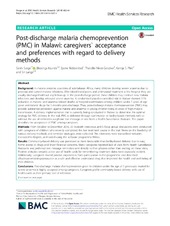| dc.contributor.author | Svege, Sarah | en_US |
| dc.contributor.author | Kaunda, Blessings | en_US |
| dc.contributor.author | Robberstad, Bjarne | en_US |
| dc.contributor.author | Nkosi-Gondwe, Thandile | en_US |
| dc.contributor.author | Phiri, Kamija S. | en_US |
| dc.contributor.author | Lange, Siri | en_US |
| dc.date.accessioned | 2019-04-16T11:52:56Z | |
| dc.date.available | 2019-04-16T11:52:56Z | |
| dc.date.issued | 2018-07-11 | |
| dc.Published | Svege S, Kaunda, Robberstad B, Nkosi-Gondwe, Phiri, Lange S. Post-discharge malaria chemoprevention (PMC) in Malawi: caregivers` acceptance and preferences with regard to delivery methods. BMC Health Services Research. 2018;18:544 | eng |
| dc.identifier.issn | 1472-6963 | |
| dc.identifier.uri | https://hdl.handle.net/1956/19359 | |
| dc.description.abstract | Background: In malaria endemic countries of sub-Saharan Africa, many children develop severe anaemia due to previous and current malaria infections. After blood transfusions and antimalarial treatment at the hospital they are usually discharged without any follow-up. In the post-discharge period, these children may contract new malaria infections and develop rebound severe anaemia. A randomised placebo-controlled trial in Malawi showed 31% reduction in malaria- and anaemia-related deaths or hospital readmissions among children under 5 years of age given antimalarial drugs for 3 months post-discharge. Thus, post-discharge malaria chemoprevention (PMC) may provide substantial protection against malaria and anaemia in young children living in areas of high malaria transmission. A delivery implementation trial is currently being conducted in Malawi to determine the optimal strategy for PMC delivery. In the trial, PMC is delivered through community- or facility-based methods with or without the use of reminders via phone text message or visit from a Health Surveillance Assistant. This paper describes the acceptance of PMC among caregivers. Methods: From October to December 2016, 30 in-depth interviews and 5 focus group discussions were conducted with caregivers of children who recently completed the last treatment course in the trial. Views on the feasibility of various delivery methods and reminder strategies were collected. The interviews were transcribed verbatim, translated to English, and coded using the software programme NVivo. Results: Community-based delivery was perceived as more favourable than facility-based delivery due to easy home access to drugs and fewer financial concerns. Many caregivers reported lack of visits from Health Surveillance Assistants and preferred text message reminders sent directly to their phones rather than waiting on these visits. Positive attitudes towards active use of health cards for remembering treatment dates were especially evident. Additionally, caregivers shared positive experiences from participation in the programme and described dihydroartemisinin-piperaquine as a safe and effective antimalarial drug that improved the health and well-being of their children. Conclusions: Post-discharge malaria chemoprevention given to children under the age of 5 previously treated for severe anaemia is highly accepted among caregivers. Caregivers prefer community-based delivery with use of health cards as their primary tool of reference. | en_US |
| dc.language.iso | eng | eng |
| dc.publisher | BMC | eng |
| dc.relation.uri | https://rdcu.be/2SWy | |
| dc.rights | Attribution CC BY | eng |
| dc.rights.uri | http://creativecommons.org/licenses/by/4.0/ | eng |
| dc.subject | Post-discharge malaria chemoprevention | eng |
| dc.subject | Dihydroartemisinin-piperaquine | eng |
| dc.subject | Community-based delivery | eng |
| dc.subject | Facility-based delivery | eng |
| dc.subject | Community health worker | eng |
| dc.subject | Text message reminder | eng |
| dc.subject | Public health card | eng |
| dc.subject | Malawi | eng |
| dc.title | Post-discharge malaria chemoprevention (PMC) in Malawi: caregivers` acceptance and preferences with regard to delivery methods | en_US |
| dc.type | Peer reviewed | |
| dc.type | Journal article | |
| dc.date.updated | 2018-07-23T11:01:38Z | |
| dc.description.version | publishedVersion | en_US |
| dc.rights.holder | Copyright 2018 The Authors | |
| dc.identifier.doi | https://doi.org/10.1186/s12913-018-3327-z | |
| dc.identifier.cristin | 1598318 | |
| dc.source.journal | BMC Health Services Research | |
| dc.relation.project | Norges forskningsråd: 234487 | |

